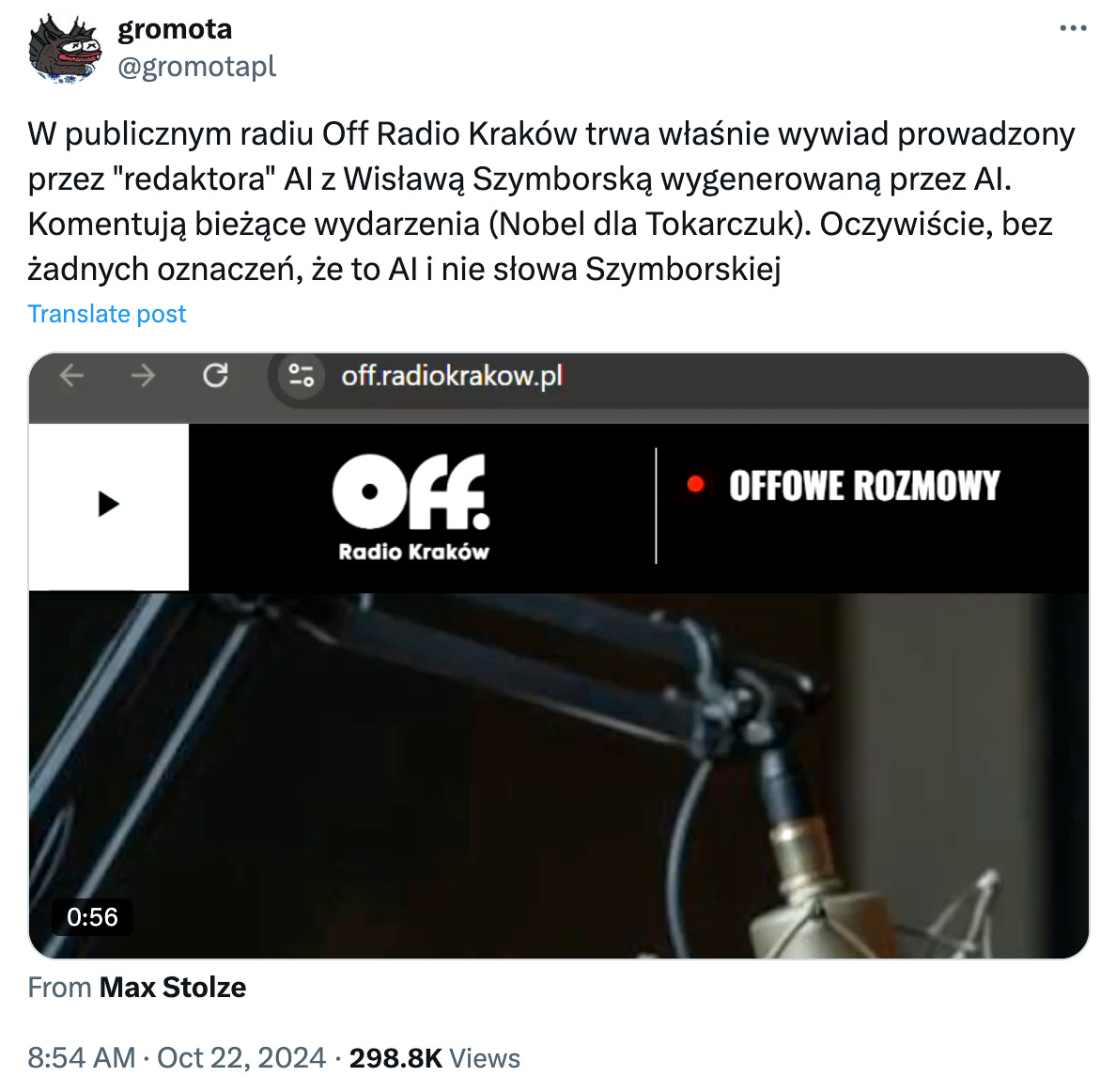AI Radio Hits the Mute Button After One Week
What we can learn from a very strange AI media experiment. Plus: Perplexity's pushback, TollBit rising, and Iron Man suits up against AI.

When Radio Kraków launched Poland's first AI-powered radio station last week, it probably expected some pushback. What it probably didn't expect was that it would pull the plug after just seven days. The public broadcaster's OFF channel — complete with AI-voiced presenters created to be "model representatives of Generation Z" — managed to speedrun the entire lifecycle of an AI media experiment, going from bold innovation to cautionary tale.
The most fascinating part isn't that the experiment failed — it's how it failed. Per reporting from Notes from Poland, the station appears to have taken a really broad point of view on how extensive AI should be used in the creative process. Case in point: It aired an AI-generated interview with deceased Nobel laureate Wisława Szymborska. I don't speak Polish, so I can't say for sure, but they don't seem to have made clear to listeners that the interview was an AI "imagining" of what an interview with Szymborska might have been like.
In other words, there seems to have been a "create first, ask questions later" approach to OFF, which predictably led to intense criticism, and even cries for more regulation. Oddly, the station's editor-in-chief, Marcin Pulit, said he was "surprised by the level of emotion that accompanied this experiment." Seriously?
To be clear, the Szymborska Foundation approved the AI-generated interview, so it wasn't conjured thoughtlessly on a whim. And before it was shut down, the station was planning a similar "conversation" with historical figure Józef Piłsudski for Poland's Independence Day. But these posthumous "interviews" obviously raise some pretty thorny questions about historical accuracy that the media has barely begun to grapple with.
Pulit tried to frame the quick shutdown as some kind of success, arguing they'd gathered a lot of observations about AI's opportunities and threats in just one week. That's a bit like claiming you meant to trip and fall. But he's not entirely wrong. The experiment did surface important questions about AI's role in media, particularly in public broadcasting. When you're using public money to experiment with replacing human workers with AI, the stakes are different than when a private company does it.
The backlash was strong enough to attract political attention, with a member of Poland's ruling coalition demanding answers from the culture ministry about what this means for the future of public radio in the country.
There are certainly many lessons to glean from Radio Kraków's failed experiment, but the main one other media organizations should take from it is this: technical capability has to go hand in hand with social acceptance. As newsrooms worldwide explore AI use cases, they need to remember what the audience thinks matters, and that transparency needs to be fundamental. Otherwise, you might find yourself writing your own hasty post-mortem after just seven days on air.
The Chatbox
All the AI news that matters to media
AI Is Good Business: If you take this past week's earnings reports from the major tech companies as a referendum on whether AI is working or not, it's a solid win in the affirmative. Alphabet (parent of Google), Microsoft, and Meta all reported strong earnings, all driven — at least in part — by AI. Google and Microsoft saw increased business from their cloud platforms as demand for AI compute rises, and Google CEO Sundar Pichai even said on the company earnings call that people using AI Overviews, which appear at the top of many searches, are using Google Search more.
However, none of this is evidence that AI is actually delivering on its promises of productivity gains and improved experiences to those using it. Whether the AI delivered what you wanted or not, the compute required is the same. And you could make a case that AI Overviews might lead to more searches precisely because they didn't hit the target the first time. Plenty of companies are "using" Microsoft Copilot simply because it's there, and their companies are paying for it. Certainly, AI isn't a fad, and we're quickly advancing out of the "experimental" phase, but when Meta claims to have the world's most-used AI (I know of nobody who uses Meta AI as their go-to chatbot), the gap between corporate claims and market reality becomes clear. (Disclosure: I've done consulting for Microsoft in the past.)
Perplexity's Counterpunch: After New Corp. sued Perplexity last week for violating the copyright of its publications' content, the online "answer engine" fired back with a public statement. Perplexity accuses News Corp. of being "short-sighted" and that its lawsuit is represented by a point of view "where publicly reported facts are owned by corporations, and no one can do anything with those publicly reported facts without paying a toll."
To be fair to News Corp., the lawsuit does cite incidents of plagiarism, where text produced by Perplexity is effectively a "regurgitation" (i.e. it matches the original articles almost exactly) Perplexity's statement says this isn't what the service designed to do, and suggests there is a lot more to what really happened in each incident. Moreover, it says News Corp. lied when it said Perplexity ignored its request to engage, claiming they responded the same day. Wherever way this conflict ends up going, be sure to bring lots of popcorn.
A Middleman for the AI-Media Mess: As the tension between AI companies and publishers reaches a boiling point, TollBit's $24 million Series A funding round suggests a market-driven solution might be in the offing. The startup's pitch is refreshingly practical: instead of having AI companies and publishers duke it out in courtrooms or negotiate hundreds of individual deals, why not create a marketplace where content licensing happens automatically based on actual usage? The fact that they've already signed up notable publishers like Time and Penske Media Corporation shows there's appetite for this approach.
But the real test for TollBit won't be getting publishers to sign up — it'll be proving that a marketplace model can deliver good value, either as an alternative or a complement to the direct deals publishers are already striking with OpenAI and Microsoft. The question is whether this middle-ground approach can scale fast enough to matter before the current wave of AI-media dealmaking solidifies into a new status quo.
Need to get up to speed on TollBit? Check out my interview with founders Toshit Panigrahi and Olivia Joslin from the summer:
Iron Man Suits Up for Legal Battle: Robert Downey Jr.'s threat to sue over AI recreations of his likeness isn't just about protecting his own image — it's about enforcing the hard-won protections SAG-AFTRA secured in its landmark 2023 deal. While the union agreement requires explicit consent for any AI-generated "digital replicas" of actors, RDJ seems to be taking an even harder line, suggesting top talent might push for stricter controls than what the basic contract provides.
The timing of Downey's stance is particularly pointed, coming as Hollywood grapples with implementing those new AI guardrails. Under the deal, studios can't just digitally clone actors without permission, but there's still plenty of gray area around what constitutes "reasonable" use of an actor's likeness. For someone like Downey, whose Iron Man portrayal is worth billions to Disney, taking a strong legal position now could help set the precedent for how aggressively performers can protect their digital rights, even with the new union protections in place.




